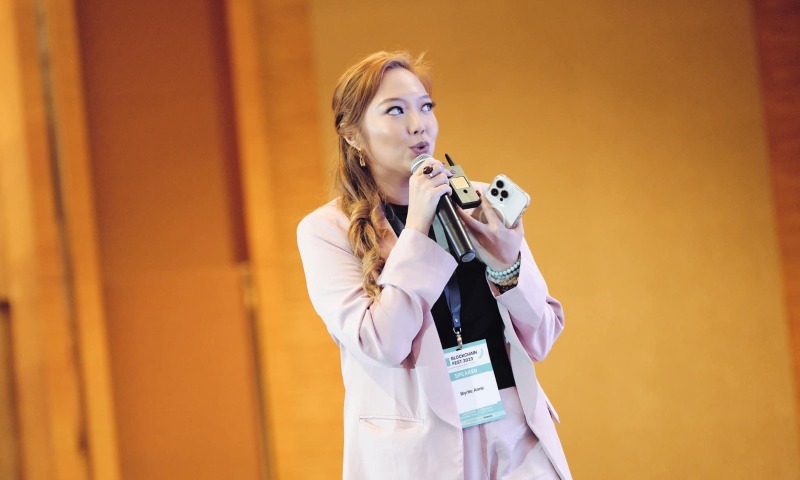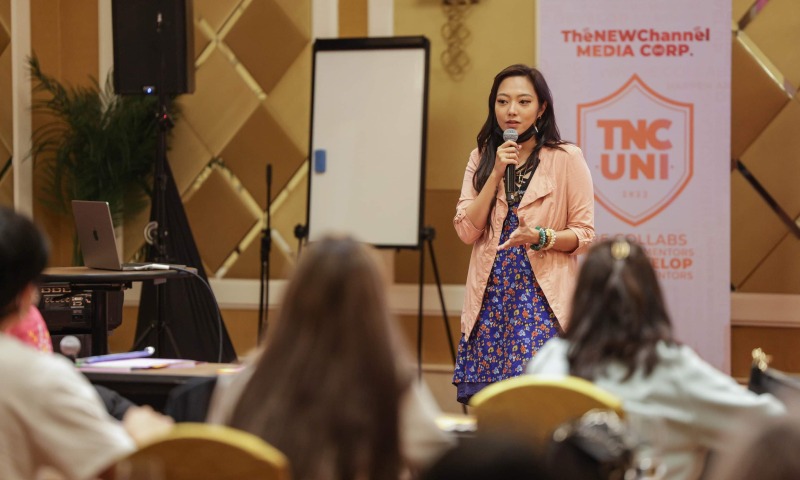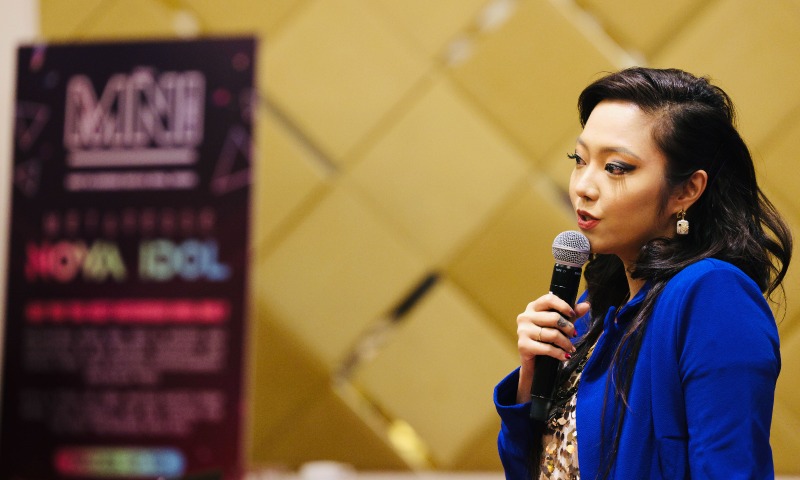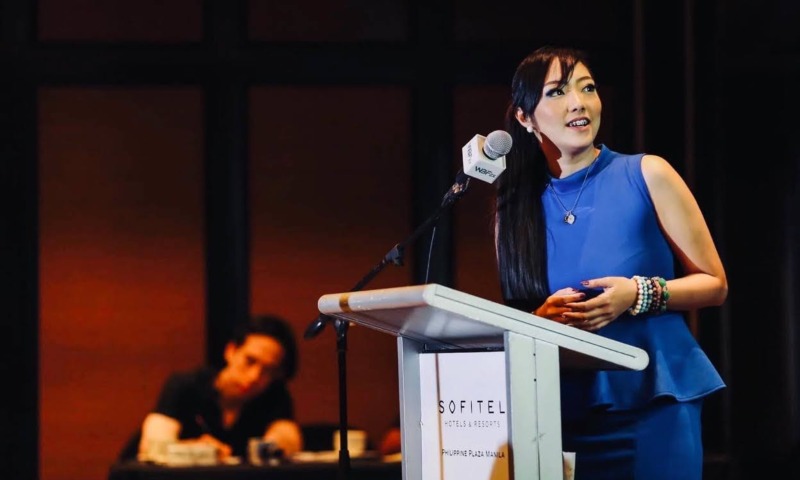Myrtle Anne Ramos is the Founder and CEO of the multi-awarded world-class company Block Tides. She is a Filipina serial entrepreneur and an angel investor who works tirelessly to create success for herself and the communities she touches. She is passionate about creating a positive impact on the world through innovation, collaboration, hard work, and determination. Her professional career has included managing international companies, leading philanthropic projects, serving on nonprofit boards, and volunteering in her local community. In addition to her leadership roles, Myrtle is an Official Member of Forbes Business Council, Official Influencer of CoinMarketCap and an advisor for many Blockchain and Tech companies.
Recently in an exclusive interview with Digital First Magazine, Myrtle shared her insights on the most favorable environment required for blockchain startups to thrive, her professional journey, challenges faced by her as a woman in blockchain, future plans, pearls of wisdom, and much more. The following excerpts are taken from the interview.
Many startups have started to explore how blockchain technology can change the way the world works. What would be, in your opinion, the most favorable environment for blockchain startups to succeed and thrive?
For blockchain startups to thrive, it is essential to empower and promote an environment encompassing regulatory clarity, access to diverse funding, a skilled talent pool, robust infrastructure, collaborative networks, user-focused solutions, scalability, education, government support, market alignment, sustainability, adaptability, and ethical considerations. When coupled with authenticity, genuine intent, and adherence to the principles of Ikigai, these elements can collectively foster innovation, value creation, and long-term success in the dynamic landscape of blockchain technology.

How could we make people trust blockchain technology and adopt it?
Blockchain technology’s widespread adoption depends on a multidimensional approach that resolves concerns, educates the public, and shows its real-world benefit. Blockchain adoption requires both technology and culture. First, accept new concepts. Blockchain applications in finance, supply chain management, healthcare, and more show how the technology increases transparency, security, and efficiency. Practicality can draw attention and inspire acceptance.
Regular Clarity
The second factor is regulatory clarity. Well-defined and balanced regulations increase trust. Laws should protect consumers, prevent misuse, and promote responsible innovation—blockchain’s skepticism decreases when people see that blockchain functions within genuine and well-governed frameworks, boosting confidence in the technology’s legitimacy and safety. Education and awareness are essential. Educational resources that are accessible, accurate, and understandable simplify blockchain. Workshops, seminars, and online courses enable people to understand the technology and participate in the blockchain ecosystem.
User Friendly Interfaces
User-friendly interfaces are needed to bridge the gap between technical complexity and mass usage. Simplifying the user experience by reducing technical hurdles and language can increase blockchain adoption. Blockchain is transparent and secure. Blockchain’s immutability, cryptographic encryption, and decentralized consensus procedures increase security and reduce fraud and manipulation. Blockchain advocates can ease security concerns by emphasizing these features.
Real-world use cases instill trust
Showing blockchain has improved supply chains and voting systems lends credibility to its claims. When they see results, people trust and use technology. Partnerships with established businesses, organizations, and governments can speed adoption. Blockchain solutions’ integration into existing systems and credible entities’ credibility boost the technology’s legitimacy and applicability.
Trust-building involves community engagement. Forming a blockchain community allows for conversation, learning, and sharing. Open talks and knowledge exchange can clear up misunderstandings and minimize adoption challenges. Misconceptions must be addressed. Blockchain’s involvement with criminal activity and energy waste often raises doubts. Accurate understanding and debunking falsehoods help ease anxieties and questions.
Prototypes are crucial
Potential adopters like case studies that prove blockchain technologies work. Real-world examples develop trust and comprehension. Ethical considerations build a solid basis. Blockchain promotes data privacy, inclusivity, and social good, aligning with ethical consumers’ beliefs—practical incremental adoption. People can learn about blockchain by using it in non-critical applications. Gradually adding higher-level use cases helps smooth the transition and reduce opposing viewpoints. This cautious adoption acknowledges the learning curve and balances eagerness and fear. Blockchain adoption is cultural. The blockchain and crypto community must promote openness, collaboration, and inclusivity. Eliminating the technology’s stigma of exclusivity and secrecy can make it accessible to everybody.
Road to Mass Adoption
Obtaining trust and adopting blockchain technology requires resolving concerns, educating the public, and demonstrating its real-world uses. Blockchain may transcend technological complexity and revolutionize numerous sectors by establishing its practical usefulness, setting clear regulations, and fostering an informed community. The technology’s features and communities, governments, and organizations’ efforts to build a trustworthy and inclusive blockchain ecosystem drive trust.

What developments are you particularly excited about that could promote the practical applications of blockchain in the coming years?
From financial services to health care, supply chain management to digital identity solutions, the effects could be huge.
Regulatory Acceptance and Integration
As countries worldwide make more precise rules and frameworks for blockchain and cryptocurrencies, the environment for innovation gets better. This gives businesses and startups the confidence to try blockchain apps within the law. It also makes it easier for traditional industries to use blockchain to make their work more efficient and transparent.
Government and Public Services
Blockchain could change how services are provided to people because it can improve data security, transparency, and accountability. From vote systems that are more open than ever before to land registries that make sure property records are correct, there are a lot of ways to improve public services.
Scalability Solutions and the Development of NFTs
Scalability issues have been a problem for blockchain for a long time, making it hard for it to handle a lot of transactions. But as scaling options like sharding and layer 2 protocols keep improving, these barriers are being taken down. This breakthrough in scalability goes along with the rising interest in Non-Fungible Tokens (NFTs), which have already changed how digital ownership works. As NFT technology improves, it could be used in many areas, from digital IDs to tracking where goods come from in the supply chain. This would change how we think about ownership and authenticity.
There is a lot of hope in these use cases because they all point to a future in which blockchain technology will be a natural part of our everyday lives. From safe and transparent government services to tokenizing assets through NFTs, blockchain is on the verge of redefining industries and challenging the status quo. In the coming years, we will see how these ideas develop and help bring blockchain’s potential to life in the real world.

Myrtle, please tell us a little bit about yourself, your career path, and what led you to establish Block Tides.
I’m a serial entrepreneur, public speaker, moderator, philanthropist, and angel investor. Before diving into the web3 space, I had a strong background in technology, marketing, and public relations. I worked with companies like Apple, Comcast, and GoDaddy in roles such as an account executive and senior quality analyst.
My journey into web3, blockchain, cryptocurrency, and the metaverse began in 2016. Initially, I entered as a trader and investor, later becoming an Investor Relations professional for a Spotify-like project and eventually a Director at Asia Token Fund Group. Motivated by my expertise in technology, advisory, branding, marketing, PR, business development, and growth, along with my passion for innovation, I founded Block Tides.
Block Tides is my way of contributing to the web3 revolution. It’s focused on education, innovation, and fostering positive change in the blockchain, crypto, metaverse, and Web 3 technology marketing fields. Through Block Tides, I aim to help others understand and leverage the potential of these transformative technologies.
Could you tell us a little bit about the work that Block Tides does?
Block Tides is a company that operates at the intersection of blockchain, crypto, metaverse, and Web 3 technology marketing fields. It is dedicated to education, innovation, and community-building within these emerging domains. Block Tides focuses on educating individuals and businesses about the potential of blockchain, cryptocurrencies, and Web 3 technologies through workshops, webinars, and training sessions. Our company also supports startups and entrepreneurs in these fields by providing mentorship, advisory services, and fostering innovation. Block Tides actively builds and nurtures a community of professionals interested in blockchain and crypto, facilitating networking, knowledge sharing, and collaboration. Pioneering events and conferences since 2017 Block Tides bring together industry experts and enthusiasts for learning and networking opportunities. Additionally, Block Tides is involved in angel investing, supporting innovative projects, and contributes to philanthropic efforts aligned with its mission. Block Tides serves as a central hub for education, innovation, community, and investment in the dynamic realm of blockchain, crypto, and Web 3 technologies.

Let’s talk about breaking the glass ceiling. What were the biggest challenges you faced as a woman in blockchain, and how did you deal with them?
Breaking through the glass ceiling in the blockchain business is hard, but people in other tech fields face the same problems. Women are often underrepresented in technical and leadership jobs, which makes it hard for them to find role models and mentors. Gender bias can make it harder to get jobs and move up in the workplace, reinforce stereotypes, and slow down progress. There are problems with networking because women don’t have as much access to links and events as men do. A workplace atmosphere that is dominated by men can make it hard for women to get ahead in their careers. Also, women’s efforts are sometimes overlooked, which hurts their chances of getting noticed and moving up.
To get around these problems, women in the blockchain field have used a variety of methods. Focusing on skill development, constant learning, and industry knowledge gives women the power to show what they know. Engaging with female teachers and joining blockchain groups for women is a great way to network and get support. Promoting gender diversity and inclusion drives change in the business and creates a more welcoming environment. Building confidence in oneself and showing off one’s skills help fight biases and create a strong professional appearance. Recognition goes up when speaking events, publications, and contributions to open-source projects make you more visible. Advocating for gender equality is strengthened by working with both male and female friends. By sharing their stories and victories, women leaders show others how to be successful and give them hope.
What opportunities do women have in crypto and blockchain technology?
In the world of cryptography and blockchain technology, there are many different possibilities for women. There are technical roles to be filled, such as building blockchains and smart contracts, as well as doing study to find new consensus mechanisms, scalability solutions, and privacy improvements. Starting companies or projects based on the blockchain is one way to be innovative through entrepreneurship. Educators and activists who are women can help close knowledge gaps by providing tools and training for education. The need for good communication in the industry has led to the creation of jobs in marketing, community management, and content planning. Legal and compliance experts are very important in a regulatory world that is always changing.
Women can learn about cryptocurrency asset management and financial research in the investment and finance world. Design professionals create easy-to-use interfaces for crypto platforms and wallets by putting the customer first. Women are encouraged to help with projects in supply chain transparency, social initiatives, and sustainable development because of Blockchain’s potential for social effect and long-term use. Community builders create places where everyone feels welcome, and women leaders drive growth in their industries and more diversity in decision-making.
Lastly, women can shape the legal foundations of blockchain and crypto by taking part in policy and regulation talks. Because the field is always changing, women have many ways to participate, come up with new ideas, and make things better.

Is the gender imbalance still felt in the same way in 2023 as it was two years ago? Are there enough women in crypto?
The gender imbalance in the crypto and blockchain industry was a significant concern. However, the landscape evolved since then. There has been substantial growth in gender diversity since 2017, with increased visibility and excitement around cryptocurrencies in 2021 attracting a more diverse talent pool. However, the focus should remain on providing the right guidance, mentorship, and opportunities to sustain and amplify this growth genuinely. Importantly, the industry’s development should prioritize genuine inclusion and representation rather than using diversity for mere publicity.
None of us are able to achieve success without some help along the way. Is there a particular person who you are grateful towards who helped get you to where you are? Can you share a story about that?
Several people have helped me get where I am today, and I owe them a lot of thanks. The constant help and sacrifices of my parents have given me the base I need to go after my goals. My daughter’s drive has always given me hope and pushed me to get through hard times. When I had doubts about my skills, my brother’s unwavering faith in me gave me the strength to keep going. Surprisingly, even the people who didn’t believe in me and said I wouldn’t make it have made me more determined to show them they were wrong. This has become a driving force in my journey. The mentors I’ve had the chance to learn from have given me great advice and helped me go in the right way. Unexpected acts of kindness and words of support from strangers have shown me how powerful encouraging words can be. In their own ways, each of these people has added to the fabric of my success story.
I also extend my heartfelt gratitude to my ancestors, whose resilience and strength have paved the way for me. Their legacy has been a source of inspiration and a reminder of the strength that runs through my veins. I’m thankful for the guidance of my spirit guides, who have provided wisdom and direction during pivotal moments. And last but not the least but the main source is to the vast universe, for its mysterious ways of aligning opportunities and challenges that have shaped my growth. Recognizing these forces reminds me of the interconnectedness of all things and the power of collective support.

What’s in store for the future of Block Tides? Do you have any cool events or anything exciting coming up?
The future of Block Tides holds exciting developments and opportunities. We’re currently working on some innovative projects that will reshape the landscape of the industry. We have a series of engaging events and workshops in the pipeline that will provide valuable insights and connections. Moreover, we’re thrilled to share that we’re venturing into the dynamic world of esports, exploring its potential within the blockchain and crypto space. Education remains a core focus for us, and we’re committed to delivering top-notch resources to empower individuals with knowledge about these transformative technologies. Stay tuned for all the incredible things we’re building and the remarkable journey ahead!
If you could give one piece of advice to a woman starting out in the crypto industry, what would it be?
If I were to offer a single piece of advice to a woman embarking on her journey in the crypto industry, it would be to “Believe in yourself and your dreams.” Trust your abilities, nurture your aspirations, and have confidence in your unique potential to make a significant impact. While inspiration is valuable, remember that your journey is uniquely yours, and forging your own path is essential. Embrace the journey with the belief that you have the power to achieve your goals and contribute to the industry’s growth. Your confidence and determination can lead to remarkable accomplishments and pave the way for meaningful change.






